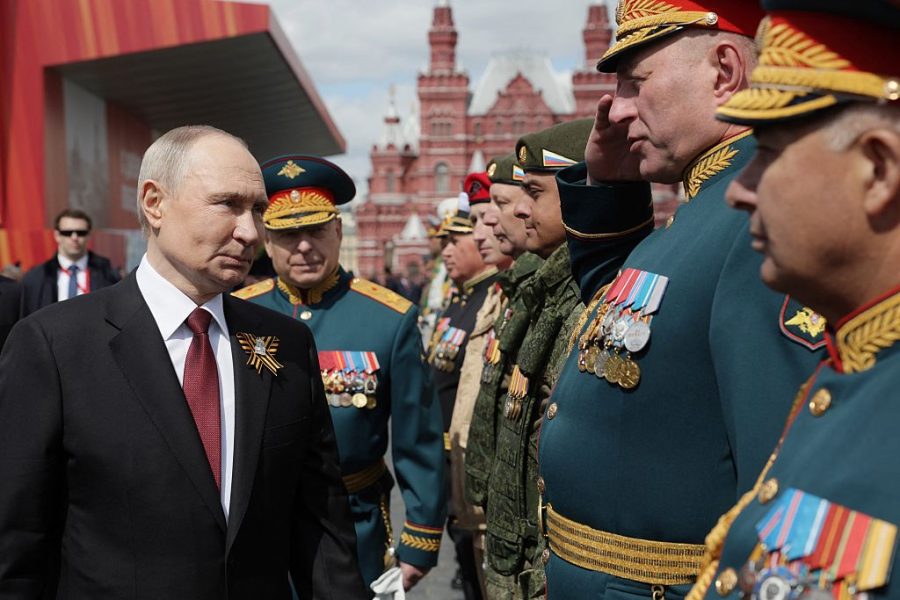It was almost like old times, but also a sign of the new. Vladimir Putin’s Victory Day parade passed off without a hitch, rumbling and squeaking with armour, untroubled by Ukrainian drones, and watched over by foreign leaders there in a sign of support. Yet the efforts made to ensure the parade ran smoothly, the nature of the guest list, and Putin’s rhetoric all highlighted the new times.
The most recent iterations of the parade had been distinctly reduced affairs, a single Second World War vintage T-34 tank substituting for the usual phalanx of tanks, and the guests largely confined to Putin’s clients. For the 80th anniversary of the end of the war in Europe – the Great Patriotic War in Russian parlance – and symbolically to signal Russia’s resurgence, Putin was determined to replay the old hits. After the T-34s came almost 200 other vehicles, from T-90M tanks to relatively new systems such as the TOS-2 Tosochka incendiary rocket launcher, Titan high-mobility vehicle, and Malva self-propelled guns, and also some of the drones being used in the war, from Orlan reconnaissance platforms, to Geran-2 strike models.
Volodymyr Zelensky wasn’t so foolish as to pick a fight with Beijing
Along with more than 11,000 troops were contingents from other countries, the largest of which was Chinese, parading under the gaze of Xi Jinping. Other foreign guests, including Brazil’s Luiz Inácio Lula da Silva, underlined Moscow’s continued standing in the Global South. The presence of the leaders of one EU member state and one wannabe – Slovakia’s Robert Fico and Serbia’s Alexander Vučić, respectively – also highlighted the divisions of the West. The roundabout route Fico had had to take when Poland, the Balts and the Finns barred their airspace to him, in what may prove a counterproductive act of pettiness, only highlighted his determination not to be browbeaten into line by Brussels and his neighbours, something the Russian media gladly reported.
After days of unprecedented Ukrainian drone attacks, which caused disruption but largely demonstrated the scale of the air defence network around Moscow, there was no direct attack on the parade. Volodymyr Zelensky wasn’t so foolish as to pick a fight with Beijing. Nonetheless, security was even tighter than usual, with phone and internet signals jammed and city centre restaurants closed.
This spectacle did, after all, require rather more effort than usual. Air defence systems were pulled in from across the country, including the war zone. Russia’s diplomats had been labouring all year to secure their foreign guests and even so, the leaders of Azerbaijan and Laos pulled out at the last minute (and India’s Narendra Modi, although in fairness he does have a potential war to occupy him). Hopes that maybe even Donald Trump might attend had long since been squashed.
Indeed, after Trump memorably (and inaccurately) claimed that ‘We won both [World] Wars, nobody was close to us in terms of strength, bravery, or military brilliance,’ it may have been an implicit riposte that – unusually for one of these speeches – Putin did not specifically namecheck the US, British and other Allied contribution. Instead, while noting that ‘the Soviet Union took upon itself the most ferocious, merciless blows of the enemy,’ he confined himself to expressing how ‘we highly value the contribution to our common struggle of the soldiers of the Allied armies, the participants of the Resistance, the courageous people of China.’ The last was an unsubtle genuflection to Xi, who was clearly the guest of honour, joining the dignitaries on the reviewing stand alongside Putin, rather than having to sit awaiting the main event, like the other foreign leaders.
Of course, Putin used this as an opportunity to equate the Great Patriotic War with his imperial war in Ukraine, claiming that ‘the entire country, society, and people support the participants of the special military operation. We are proud of their courage and determination, that strength of spirit that has always brought us only victory.’ Well, maybe. Certainly, this was a day of not just officially-choreographed patriotism, but genuine national pride. During rehearsals this week, soldiers have been greeted with applause and when Putin was leaving the event, he was greeted with what seem to have been genuinely spontaneous chants of ‘Russia’.
However, this is still regarded primarily as a celebration of 1945 rather than, as the Kremlin would prefer, an affirmation of modern national power and manifest destiny. A majority of Russians want peace negotiations with Ukraine, and as one commentator on social media put it, ‘we should remember the heroism of our grandfathers’ but ‘those tanks on Red Square are being paid for by my kids’ futures’.
In fairness, the Russians do know how to put on a good show. Tomorrow, the economy will continue overheating, soldiers will be fighting and dying on the front, and Putin will still be guessing whether Donald Trump will be walking away from or maintaining support for Kyiv. But today, Putin is probably happy.








Comments